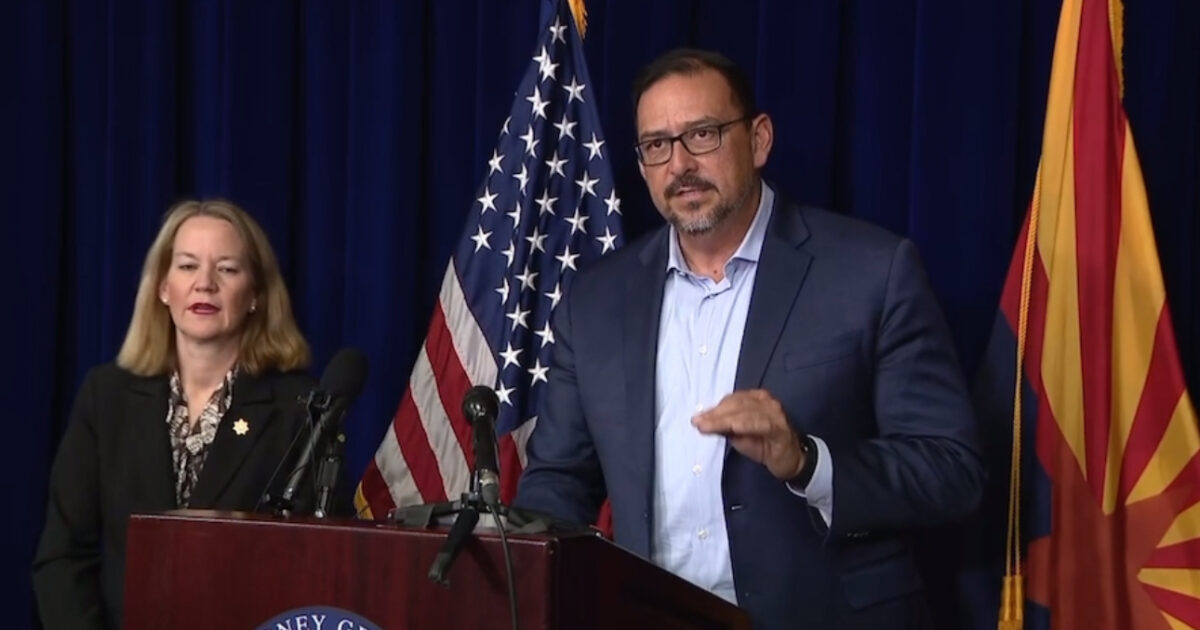Arizona Secretary of State Adrian Fontes alongside Arizona Attorney General Kris Mayes
One of the more concerning vulnerabilities in our elections system is the Uniformed and Overseas Citizens Absentee Voting Act, or UOCAVA. The Gateway Pundit has written numerous articles about UOCAVA vulnerabilities, including articles about Iranian hackers breaking into UOCAVA voter databases and using the names and information of voters to cast UOCAVA ballots, a top UOCAVA expert revealing its vulnerabilities, and concerns about Georgia accepting UOCAVA ballots after the deadline expired.
Part 1: Georgia’s 2024 Election: 2020 ‘Censorship Czar’ Receives $1.45M From GA Secretary of State for ‘Audit’
Despite these vulnerabilities, Arizona Secretary of State Adrian Fontes announced on Friday that his office had launched a “new, secure voting system” for UOCAVA voters.
The pilot program will be used for the Special General Election for Congressional District 7. According to the press release, the Arizona Secretary of State has partnered with Enhanced Voting to implement the system.
The press release states that:
“Historically, UOCAVA voters in Arizona were required to waive their right to a secret ballot to vote due to how those ballots were processed once they were returned to Arizona’s county election officials.
‘Enhanced Ballot changes that. When used as designed, it guarantees ballot anonymity, placing UOCAVA voters on equal footing with state-side voters,’ Fontes said. ‘The system eliminates the need for duplication, reduces the risk of overvotes, and ensures that ballots are cast accurately and securely.’
Where concern should arise is the method by which those ballots will be cast. Enhanced Ballot is claimed to make it easier for voters, particularly those who “may not have access to a printer or scanner.”
Enhanced Ballot will allow “voters to complete the entire voting process from a personal device, including signing their ballot affidavit” while still allowing voters to also print a physical ballot and mail it back. Under the FAQ portion, it states, “The Enhanced Ballot is designed so that you can vote using whatever device you have, even a cell phone.
It sounds like online voting has arrived and is being heralded as “convenient.” But rest assured, “The system has undergone rigorous testing, and contingency plans are in place” including ballots processed through “Logic & Accuracy tested tabulators” for the paper ballots.
Iranian hackers were able to infiltrate state voter rolls. Allegedly, Elliot Kerwin, an Arizona resident and reportedly a computer professional, was able to access Arizona’s voter rolls in 2020 from his own home. Allowing UOCAVA voters to vote online sounds like a disaster in the making.
Old Players Emerge
Spearheading this effort, as mentioned, is Enhanced Voting. The Gateway Pundit previously covered controversy with Enhanced Voting in Georgia following their implementation of Optical Character Recognition, or OCR, to conduct audits in Georgia’s 2024 Presidential Election. From The Gateway Pundit’s reporting on this in March 2025:
Fast Forward to 2024 – the Georgia “Auditors”
The Georgia legislature passed House Bill 794 in May 2024, which went into effect in July 2024. One of the key components of HB794 was the requirement for the Secretary of State’s Office “to provide for a pilot program to audit paper ballots using optical character recognition.” (OCR)
In August 2024, SOS Brad Raffensperger entered into an agreement with Enhanced Voting to conduct the OCR “audit” of the Nov. 5, 2024 General Election. In following segments of this series, we will go through some of the inconsistencies and discrepancies that Phillip Davis uncovered during his examination following the 2024 Election.
The President and Founder of Enhanced Voting is Aaron Wilson. Wilson has a history in the election-sphere dating back to his time at the Florida Department of State in 2005 and the Florida Division of Elections from 2007 to 2009, according to his LinkedIn.
After a brief stint as an “embedded software engineer analyst” at Lockheed Martin, Wilson went to work as a project engineer at Scytl Secure Electronic Voting from 2010-2011. Scytl was at the heart of the controversy around the 2020 Election when it was discovered that many websites for States’ Election Reporting was run by Scytl, a Barcelona, Spain-based company. Following his time at Scytl, Wilson worked for five years at Greenshades Software before landing at Clear Ballot Group as the Director of Product Innovation.
But Wilson’s employment from Jan. 2019 through April 2021 is the most concerning. During this time, he was the Senior Director of Election Security at the Center for Internet Security.
Notable to that previous report, Aaron Wilson, the President and co-founder of Enhanced Voting, has previously worked for the Center for Internet Security (CIS) and was involved in the mass censorship of American citizens leading up to and following the 2020 Presidential Election.
CIS also is partners with the Department of Homeland Security to offer ‘election security’ to local jurisdictions at no cost to them. The Center for Internet Security is therefore not just foundational in securing local jurisdictions’ election systems at the expense of the federal government, but they were also key figures in censoring anyone who would dare challenge the legitimacy of those elections following the 2020 election through the Information Sharing and Analysis Centers (EI-ISAC).
Part 1: Georgia’s 2024 Election: 2020 ‘Censorship Czar’ Receives $1.45M From GA Secretary of State for ‘Audit’
How This Ties to Arizona
According to Fontes’s press release, the Center for Internet Security, Enhanced Voting President Aaron Wilson’s previous employer, played a role in the approval of Enhanced Ballot, giving it a Rabet-V certification, stating it’s the “only product of its kind to receive this certification.”
From the press release:
One of the reasons the state chose Enhanced Voting to provide support for this initiative is their excellent reputation for cybersecurity protection. The Enhanced Ballot received Rabet-V certification from the Center for Internet Security, the only product of its kind to receive this certification. Additionally, Enhanced Voting is SOC 2 Type II certified, ensuring that election and voter data is secure, strong controls over availability, confidentiality and privacy are maintained, and security monitoring and accountability is continuous.
Under the FAQ section of the SOS press release, Enhanced Ballot is said to be:
“…a secure, electronic ballot delivery system used by certain eligible voters who are military members serving out of state and U.S. citizens who are overseas. It allows them to quickly access, mark, and securely return their ballot without the need for printers or scanners.”
The FAQ goes on to claim that Enhanced Ballot is SOC 2 Type [II] certified and uses “encrypted, one-time-use links to ensure only the intended voter can access the specific ballot” and claims that Enhanced Ballot does not increase the risk of election tampering.
“Enhanced Ballot follows strict security and compliance standards. Voting information and ballots are encrypted in transit and at rest to prevent unauthorized access.”
If the Iranians and other bad actors were able to access UOCAVA voter rolls and use personally identifiable information to cast ballots previously, what’s to stop them from attempting to gain access to this system and manufacturing illegitimate UOCAVA ‘ballots’?
Part 1: Georgia’s 2024 Election: 2020 ‘Censorship Czar’ Receives $1.45M From GA Secretary of State for ‘Audit’
“Secretary of State Adrian Fontes announced the launch of the new system on Friday for military and overseas voters who are registered to vote in Arizona and eligible to vote through the federal Uniformed and Overseas Citizens Absentee Voting Act, or UOCAVA. These voters will now…
— Jennifer Asper (@j3669) August 11, 2025
Ballots for military and overseas voters are being sent out for the Congressional District 7 Special General Election. Our office has partnered to launch a new voting system to make the process easier and provide anonymous ballots. For more information or to find FAQ’s, visit… pic.twitter.com/eAtoYS5443
— Arizona Secretary of State (@AZSecretary) August 8, 2025
The post Arizona to Pilot Overseas UOCAVA Voting Program Using Voter’s “Personal Device,” to Include Cell Phones appeared first on The Gateway Pundit.











